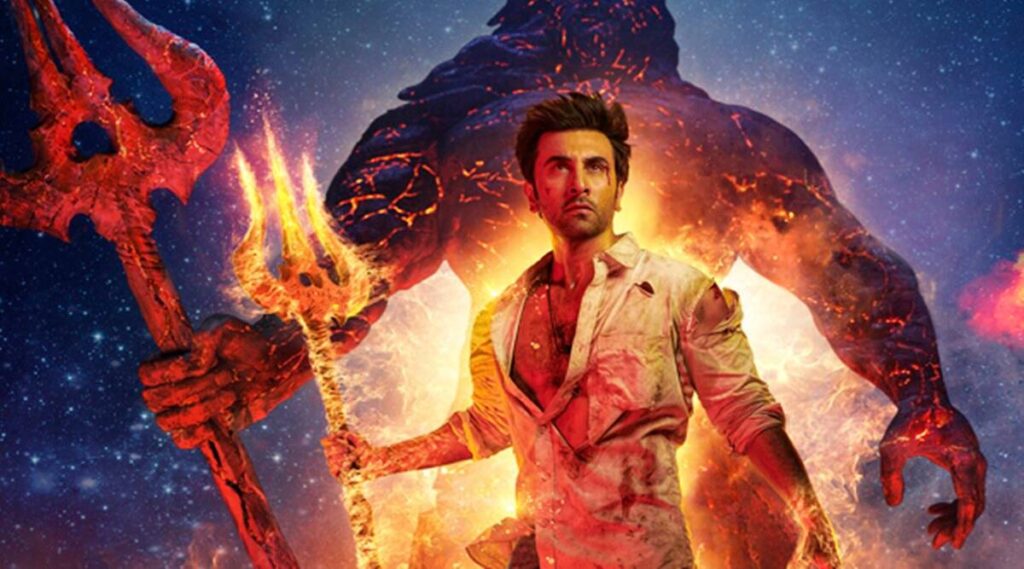Brahmāstra Part 1: Shiva, the first instalment in director Ayan Mukerji’s ‘Astraverse’ trilogy, tells the tale of a young man, who must fulfil his destiny by saving the universe from destruction. The film is spectacular to look at, dazzling with its stunning visual effects and high octane action sequences but a weak script, coupled with some terrible dialogue, drag the merits of the film down majorly.
A scientist, Mohan Bhargav (Shah Rukh Khan and no, we are not in Swades!), is held hostage by the evil Junoon (Mouni Roy) as he has a piece of stone that constitutes one of three parts of the Brahmāstra. The Brahmāstra is a supernatural weapon so powerful that it is capable of destroying the entire universe. Junoon aims to bring together the three pieces of the Brahmāstra in order to resurrect her dead leader, Brahmadev, and together, they would take over the universe. Torturing Mohan enough to find out who posses the remaining two parts of the Brahmāstra, Junoon manages to get one name out. But before she can get Mohan to reveal the name of the final individual, he dies by suicide. Meanwhile, a young DJ, Shiva (Ranbir Kapoor), ‘sees’ the entire event through a dream-like process. The rest of the film explores how he and his girlfriend, Isha (Alia Bhatt), take on the destructive forces with the help of Guruji (Amitabh Bachchan).
In constructing an epic world of fantasy and adventure, Mukerji borrows heavily from elements from Indian mythology. All the dazzle-dazzle, filmed by several cinematographers, bring his grand visualization to life effectively as the film is undoubtedly good to look at. However, as is the bane of many a Bollywood film, the story and the tepid writing make the film fall short of ‘being there’. The script of Brahmāstra Part 1: Shiva is far too simplistic and devoid of any nuance, complexity or layering whatsoever. While it takes much inspiration from similar Hollywood films, it tells its story minus their soul. None of the major characters are fleshed out well enough for us to remain invested in their adventures. Post interval, everything in the film becomes a verbose exposition, more of a tell-don’t-show as Guruji reveals one piece of information to Shiva, from his connection to the Brahmansh to the utility of each of the astras and how to maximize their hidden powers. Surprisingly, the dialogues are penned with a such a laughable, cringe-worthy sensibility that it is difficult to believe that it is the same Hussain Dalal, who also had co-dialogue credit for Mukerji’s earlier uber-cool Yeh Jawaani Hai Deewani (2013).
Mukerji appears to be aware of the screenplay’s shortcomings as he tries to compensate by infusing a spectacular action sequence, helped by some wonderful visual effects, or a catchy song whenever the film starts to sag. This works in places but not in its entirety. For instance, when Shiva realizes that the life of Anish (Nagarjuna) is in danger and he should rush to Varanas, Isha volunteers to accompany him. This scene is immediately followed by a song. This not only dilutes the seriousness of Shiva’s purpose but also makes the song feel forced rather than it being organically fitted into the narrative. The many references to Hindu Gods and Goddesses to help create the ‘Astraverse’ are cursory and again, are just not well integrated within the film. It is also surprising that the characters despite possessing superpowers and astras are injured by bullets shot from guns.
It is the various technical teams, who deserve the maximum applause for the film as they lift Brahmāstra Part 1: Shiva not by one or two, but by several notches. The band of cinematographers – V Manikandan, Anil Mehta, Pankaj Kumar, Sudeep Chatterjee, Vikash Nowlakha and Patrick Duroux – has worked wonderfully in tandem with the VFX team to create a spectacle. Every frame vividly brings Mukerji’s vision to life. The deft editing by Prakash Kurup never allows the film to lose its momentum. Even at times when scenes appear wobbly due to the sluggishly written scenes, Kurup does his best to ensure he keeps up the pace of the narrative. The action scenes, in particular, are edited superbly and constantly raise our adrenaline level, keeping us to the edge of our seats while the grand sound design by Bishwadeep Dipak Chatterjee enhances the overall cinematic experience of the film. The songs composed by Pritam are melodious while Simon Franglen’s eclectic background score layered with ‘shlokas’ or verses from Hindu mythology during the fighting scenes heightens our emotions.
Ranbir Kapoor effortlessly slips into the shoes of a tormented character who has to make a super heroic effort to save the universe Alia Bhatt as Isha (a synonym for Shiva’s consort Parvati) is a delight to watch onscreen and more than justifies her presence in the final moments of the film. Amitabh Bachchan as Guruji performs his role as a mentor with the utmost conviction. The cameos by Nagarjunaand Shah Rukh Khan fit seamlessly with the storyline and the seasoned stars are expectedly spot on. The surprise packet of the film is Mouni Roy, who makes Junoon the perfect and powerful antagonist for Shiva.
Brahmāstra Part 1: Shiva gives us that big screen experience that big budget mainstream Hindi filmdom has failed to provide for a while. If only Mukerji had worked as hard on the script and imaginatively just like he has on the technical department, the film could easily have been one of the best cinematic creations of Indian cinema this year. We can only hope that he rectifies this for the second instalment. Content is King, after all.
Hindi, Fantasy, Adventure, Action, Color


